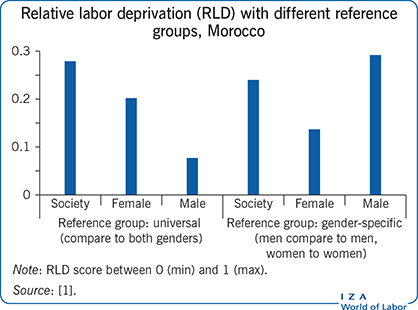Elevator pitch
Why do different population groups (e.g. rural vs. urban, youth vs. elderly and men vs. women) experience the same objective labor status differently? One hypothesis is that people are more concerned with relative deprivation than objective deprivation and they value their own status relative to the status of their peers—the reference group. One way to test this hypothesis in the labor market is to measure individual differences in labor status while controlling for characteristics that define population groups. This measure is called “relative labor deprivation” and can help policymakers to better understand how labor claims are generated.
Key findings
Pros
Relative labor deprivation offers one viable approach to quantify feelings of deprivation across population groups.
The measure is simple and grounded in a long tradition of studies on relative deprivation across the social sciences.
Relative labor deprivation recognizes that individuals derive their own labor related frustrations by comparing their own labor conditions with those of their peers.
Policymakers can use relative labor deprivation to distinguish between objective and subjective feelings of deprivation in the labor market.
Cons
Interpretation of the relative labor deprivation measure is not always straightforward, requiring knowledge of the relative deprivation concept and basic econometric skills.
During early stages of research, relative labor deprivation should normally be accompanied by surveys that measure subjective deprivations in the labor market to validate results.
Relative labor deprivation is based on assumptions that do not necessarily hold in all cases (e.g. when differential treatment involves non-peer groups).
Relative labor deprivation is highly sensitive to model specification and is reliant on the researcher’s capacity to identify the variables people use to define their peer groups.
